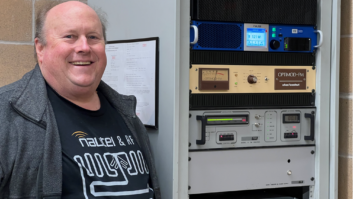LPFM advocates are jubilant that a bill to increase the number of 100-watt stations awaits the president’s signature after congressional passage.
The measure directs the FCC to drop third-adjacent minimum distance separation requirements between low-power FM stations and full-service FMs, FM translators and FM boosters, in order to fit more LPFMs on the dial. According to the FCC’s count, there are 835 low-power stations on the air.
The commission may grant a waiver of the second-adjacent channel distance separation requirement to LPFMs that establish that their proposed operations will not result in interference to any authorized radio service.
The version passed by lawmakers also specifies the new stations cannot cause interference to existing full-power FMs and, if they do, will have to go off the air while the interference is eliminated.
The minimum distance separation requirements are meant to protect radio reading services on FM analog subcarriers from potential interference by LPFMs as well.
What passed is a compromise version that specifies that LPFMs are a secondary service, equal to FM translators but secondary to full-power FMs, meaning they’ll have to accommodate full-power FMs that want to upgrade. The change codifies what had been FCC policy into law.
According to the final version of H.R. 6533, passed by the House and Senate, when there’s competition between an LPFM and an FM translator for the same allocation, the FCC must decide who gets it “based on the needs of the local community.”
The FCC will need to develop or modify its rules for the new stations and announce an application filing window for those who want to apply for an LPFM.
The advocacy group Free Press was ecstatic about the bill’s passage and credited numerous groups for working on the issue over the years.
It thanked Prometheus Radio Project, Future of Music Coalition, Media and Democracy Coalition, Media Access Project, National Hispanic Media Coalition, United Church of Christ Office of Communication, Inc., U.S. Conference of Catholic Bishops, Christian Coalition, Catholic Radio Association, MoveOn.org, ColorOfChange.org, New America Foundation, Media and Democracy Coalition and others.
Candace Clement, outreach manager for the Free Press Action Fund, called the lawmakers’ action a “huge victory in the fight for better media. “We are thrilled that Congress has finally passed legislation that will put the airwaves back in the hands of our communities. The Local Community Radio Act will make it possible for hundreds, if not thousands, of new local radio stations to go on the air.”
NAB, which has said it did not oppose the concept of LPFMs but wanted to protect full-power FMs from interference, invited LPFM supporters to the NAB headquarters for an event after the New Year “heralding passage of the legislation,” as RW reported earlier.










